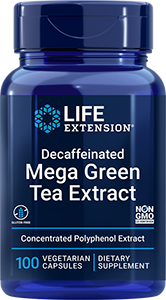| Life Extension Update Exclusive Clinical trial finds green tea catechins prevent prostate cancer in high risk men
In another exciting presentation at the 96th Annual Meeting of the American Association for Cancer Research held in Anaheim, California this month, Saverio Bettuzzi, PhD of the University of Parma, Italy reported that green tea catechins (GTCs), the compounds present in tea that are believed to be responsible for its health benefits, prevented prostate cancer in men at high risk of developing the disease. The finding represents the first time that green tea has been demonstrated to help prevent prostate cancer in a clinical trial. A team from the University of Parma and the University of Modena and Reggio Emilia administered 200 milligrams free caffeine green tea catechins three times per day to 32 men with high grade prostate intraepithelial neoplasia, while 30 men with the condition received a placebo. Prostate intraepithelial neoplasia is a premalignant condition of the prostate that becomes cancerous within one year in one-third of those afflicted. Biopsies of the prostate were conducted at six and twelve months. An average 17 percent drop in prostate specific antigen (PSA) levels occurred after 9 months in the group who received catechins. After one year, only one man in the group who received green tea catechins had developed prostate cancer compared to a predictable 9 out of 30 in those who received the placebo No significant side effects were reported. In previous research, Dr Bettuzzi and colleagues identified a gene involved in apoptosis called Clusterin as possibly influenced by green tea. Apoptosis is the programmed cell death that is one method the body utilizes for destroying undesirable cells. The tea catechin known as EGCG was found to induce apoptosis in cancerous cells while not affecting normal cells. Dr Bettuzi stated, "Numerous earlier studies, including ours, have demonstrated that green tea catechins, or pure EGCG (a major component of GTCs), inhibited cancer cell growth in laboratory models. We wanted to conduct a clinical trial to find out whether catechins could prevent cancer in men. The answer clearly is yes." He added, "We still don't know enough about the biological processes leading to prostate cancer. The only thing we know for sure is that prostate cancer is diffuse, related to age and more prevalent in the West. Thus, prevention could be the best way to fight it." | 




